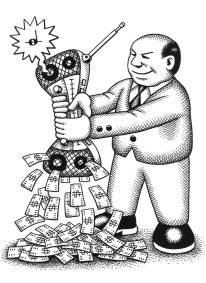Radio For Sale: The End of Radio Station Super-Sizing
Labels: Acquisitions, Big Media, Consolidation, For Sale, Future of Radio, Media Trend Watching, merger, NAB, Post-Telecom, Privatization, Radio, Radio Stations, Sell, Super-sizing Radio's been hot on the selling blocks lately, with more than two thousand station transactions in 2006 in the U.S. The last time that many stations were sold off was back in 1997.
Radio's been hot on the selling blocks lately, with more than two thousand station transactions in 2006 in the U.S. The last time that many stations were sold off was back in 1997.
The difference?
Then: consolidation merger mania. Now: The post-consolidation end of super-sizing.
Clear Channel leads the "For Sale" movement spinning off lesser market properties while trying to go private. Spanish-broadcasters Univision did go private last June for almost $13 billion. Infinity shed about 35 stations in the past 6 months. Bonneville station swapped with Entercom. And, most recently, Citadel completed its 18-month financial journey purchasing ABC Radio. The last time radio saw this amount of selling action was right after the Telecom Bill of 1996, which changed all the owership limit rules, spurred fast merger and acquisition consolidation and created super-sized radio groups.
The last time radio saw this amount of selling action was right after the Telecom Bill of 1996, which changed all the owership limit rules, spurred fast merger and acquisition consolidation and created super-sized radio groups.
Back then, market values for stations soared as groups raced to get "big" as fast as possible...all in the name of increasing radio's competitive position for ad dollars against other media (or so we were told), damn the consequences.
Ten years later, stations are selling again...but the motivation is different this time around.
"Less is more" might really mean "cluster/group right-sizing".
Instead of station sales creating mega radio groups, radio is scaling back by selling off to smaller groups...or even to brand new small groups. This brings more competition back into radio and creates more-manageable operations, especially in the unrated, small-sized, and mid-sized markets.
Radio needs this retro trend of ownership diversfication, which hopefully can attract fresh creativity and innovative content ideas that work.
Meanwhile, station groups in Canada are being sold off, too...with Astral making a play for Standard and CHUM going to BellGlobal...but there's a difference between radio in Canada and the U.S. Now that we've entered the post-consolidation phase, what did the last ten years bring to radio? There are a small few who made a ton of money, some who made a little and then there's the overwhelming majority -- people who lost gigs and careers (and money) as well as radio listeners who gave up, moving on to different (better) media choices (or, at least away from commercial radio and over to either NPR or new media forms of radio).
Now that we've entered the post-consolidation phase, what did the last ten years bring to radio? There are a small few who made a ton of money, some who made a little and then there's the overwhelming majority -- people who lost gigs and careers (and money) as well as radio listeners who gave up, moving on to different (better) media choices (or, at least away from commercial radio and over to either NPR or new media forms of radio).
Radio remains important and profitable. This new active buy/sell phase is good for radio, leading to smaller major radio groups (as opposed to massive, complex-to-manage divisions).
With all these recent station sell-offs, what bodes for radio's future? Will it improve quality? Minimally, the gap between executive management and the content will shrink somewhat (that's good). Will radio reinvest in creativity and real (not just financial) innovation? Going private and having radio less beholden to Wall Street is also a good thing. But what about that elusive increase in radio's share of total advertising dollars?
And what about radio's issue fighting against the proposed XM/Sirius merger when radio is trying to get its own house in order?
The chart below shows the amount of station selling activity last year:
BIAfn reports:For the first time since 1997 radio station transactions reached levels above 2,000 in 2006, according to the first edition of BIA Financial Network’s quarterly Investing In Radio® Market Report. The breakdown of 1,544 station sales in radio markets (as defined by Arbitron) and 562 unrated areas last year (compared with 1,613 and 637, respectively, in 1997) [led by the proposed privatization of Clear Channel Communications]...demonstrate an interest in the purchase of small market stations as long term investments.
 Is radio making a U-Turn? Is old school sanity returning to radio? Was the consolidation run-up just another merger mania cash grab? Did radio watch "Super Size Me" and decide it needed to reduce to "get healthy"?
Is radio making a U-Turn? Is old school sanity returning to radio? Was the consolidation run-up just another merger mania cash grab? Did radio watch "Super Size Me" and decide it needed to reduce to "get healthy"?
Will former radio leaders run out of the industry due to consolidation find new opportunities to return and reinvest? Will Wall Street continue to downgrade radio? Is the unretirement of Dan Mason a sign of things to come for the industry?
So what is the future of radio? There will be lots to discuss at next week's NAB show in Las Vegas April 14-19.
posted by Unknown @ Sunday, April 08, 2007,
,
![]()
![]()
XM/Sirius Merger: WWHT? (What would Howard think?)
Labels: CBS Radio, competition, FCC, Jointblog, Karmazin, merger, NYPost, rumours, Satellite, Sirius, Stern, XM "Wha-wha-WHAT?" (if you've been a Stern fan over the years, you know the SFX)...
"Wha-wha-WHAT?" (if you've been a Stern fan over the years, you know the SFX)...
This gave me a laugh reading Jossip's Media Blitz this morning. Too bad I was drinking my coffee at the time (thank god for Bounty):Sirius and XM merger described as imminent possibility; Howard Stern described as "too rich to care."
Of course, whether this announcement happens or not, the next 15 months of FCC regulatory hell would serve as either a sideshow or a distraction...and Stern will still be "too rich to care".
(canned applause in response)
Obviously, it is a BIG deal, if it can get through. A predicted operating savings of $7 Billion (if an accurate estimate) means satellite radio has a much better chance of thriving and surviving. But at what cost will come those savings? There's always a cost... Update at 1:30PM EST: ABC NEWS has "confirmed" through their sources the merger deal is happening today, although it has not been announced or commented directly by either XM or Sirius officials...yet.
Update at 1:30PM EST: ABC NEWS has "confirmed" through their sources the merger deal is happening today, although it has not been announced or commented directly by either XM or Sirius officials...yet.
So...if the story is accurate and eventually approved, how would the merger play out? Here's one way to see it...(click through)
Here's another point of view from Wall Street. And more. And yet more comments on the possible end of XM's and Sirius' head-to-head competition.
Winners and losers? Your thoughts?
Another update (3:45pm EST): It's now official.
For a MoneyCentral financial analysis of Sirius share/investor history and its future prospects, click here.
So what does Howard Stern and Mel Karmazin think about the merger? Click here and here.
posted by Unknown @ Monday, February 19, 2007,
,
![]()
![]()
John Parikhal on What if XM and Sirius do merge?
Labels: gadgets, Joint Communications, Jointblog, Karmazin, merger, New Media, Pinero, Radio, Satellite, Sirius, XM The merger speculative talk about a possible XM and Sirius merger continues to stay red-hot.
The merger speculative talk about a possible XM and Sirius merger continues to stay red-hot.
There are many pros (reduced operating and competitive costs, larger OEM relationship network, etc.) and cons (FCC opposition, less competition no longer contraining subscriber fees, incompatible technologies, etc.). The Street.com's Jim Cramer loves the idea -- while Wall Street continues to speculate.
If it happens, the deal will have to happen soon (within the next 6-8 weeks, and approved by company stakeholders by this summer) if it is to pass through all the regulatory hurdles before the 2008 elections.
Bridge Ratings just released their updated subscriber projections (assuming the two companies don't merge), anticipating a total of 35 million subscribers by 2020. Here's their provided chart: Both XM Radio's CEO Hugh Pinero and Sirius Radio's CEO Mel Karmazin publically say they are not exploring combining the satellite radio into one company. Of course, that doesn't cover any possible private conversations.
Both XM Radio's CEO Hugh Pinero and Sirius Radio's CEO Mel Karmazin publically say they are not exploring combining the satellite radio into one company. Of course, that doesn't cover any possible private conversations.
If the merge did happen, who would win?
Joint Communications' CEO John Parikhal shares his thoughts on a possible XM and Sirius merger: XM and Sirius have different programming philosophies. Sirius has more technical problems than XM. In a perfect world, XM would win.
XM and Sirius have different programming philosophies. Sirius has more technical problems than XM. In a perfect world, XM would win.
But ... Mel Karmazin is a smart cookie. He's pushing for a merger to deflect the fact that Sirius is far behind XM. My bet is (I could be wrong) that he figures Wall Street will crown him to run any merged entity ... so he beats the merger drum.
Because ... XM has fumbled the marketing ball more than once. They have not created enough need. Which is what gives Mel his bully pulpit.
XM had a huge opportunity to grow during the early years of consolidation when the arrogant roll-up artists were bragging about how they could run 16 minutes of spots an hour on music radio. Where was XM with a "commercial free" ad campaign? Instead we got stupid TV ads with David Bowie crashing through the roof.
XM still shies away from "commercial free" music with lots of choice, choosing to promote second tier programming that has big names but little that is fresh or new. And ... much of the "talk" and news programming has commercials!! How many people are going to pony up $14 a month for Oprah's sidekick (Oprah is not really Oprah) or to listen to a golf match.
XM lost the chance to cripple if not kill Sirius when it raised its price to $14 a month from $10. They could have clobbered Sirius (before they hired Stern) by focusing on what a deal $10 a month was compared to Sirius $14.
Having said all this ... there's still a good business in satellite radio. There is a real market of between 20 and 25 million people for the product. It will coexist with terrestrial radio just as cable coexists with network.
Both companies need to focus on marketing, not personality stunting, if they are going to get the respect they deserve. They might take a page from the old Rolls Royce advertising strategy - who focused on those who already bought a Rolls - "reminded" them of how great their car was - tried to make others envious - used "emotion" to create the need.
posted by Unknown @ Saturday, January 27, 2007,
,
![]()
![]()















